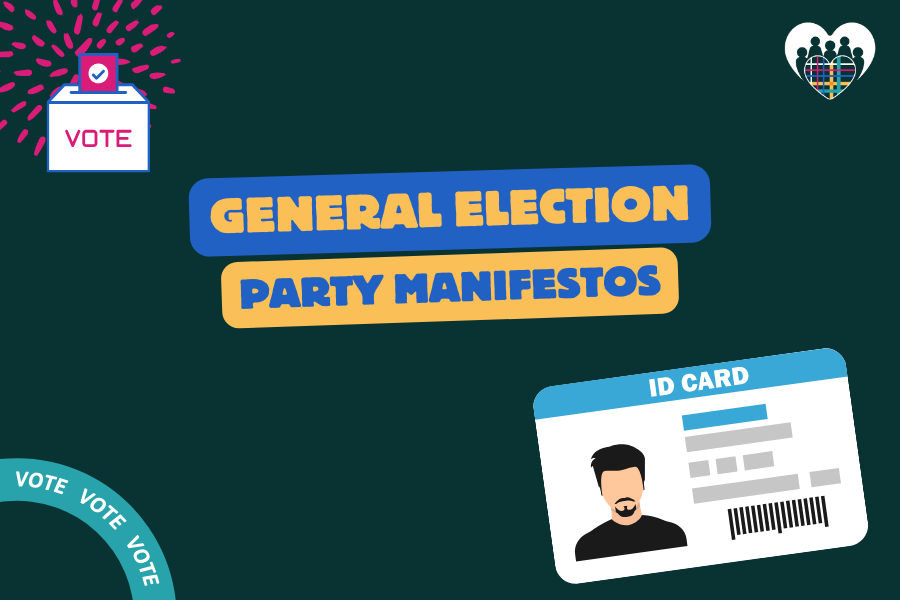With the General Election just under a week away, we wanted to make sure that our members were prepared for the polls! We’ve delved into the main Scottish Party Manifestos to identify key policies and proposals that will impact the Care Experienced community. Whilst not all of the manifestos directly mention The Promise, care experience, or the United Nations Convention on the Rights of the Child (UNCRC), many manifesto aims address the systemic issues that the Care Experienced community faces.
Underneath each key theme, click on the political party to find out what they’ve said they’ll do for you.
Specific Mentions of Care Experience
- Manifesto does not explicitly mention the Care Experienced community, The Promise, or the UN Convention on the Rights of the Child (UNCRC). However, some of their manifesto aims will provide support in tackling the systemic issues that Care Experienced people face.
- Manifesto does not explicitly mention the Care Experienced community, The Promise, or the UN Convention on the Rights of the Child (UNCRC). However, some of their manifesto aims will provide support in tackling the systemic issues that Care Experienced people face.
The Scottish Labour Party specifically mention Care Experienced young people, The Promise and the UNCRC:
“Understanding the unique challenges for our Care Experienced young people and empowering them to fully participate in education and wider life is a crucial part of delivering opportunity for all. Scottish Labour reaffirms its commitment to The Promise and recognises the importance of the ongoing implementation of the United Nations Convention on the Rights of the Child (UNCRC).”
The Scottish Liberal Democrats don’t specifically mention The Promise, but they do mention the Care Experienced Community and the UNCRC. Aims related specifically to the UNCRC and care experience are:
- Make Care Experience a protected characteristic under the Equality Act (2010) to strengthen the rights of people who are in or have been in care.
- Incorporate the UN Convention on the Rights of the Child into UK law.
There is no explicit reference to children’s social care in the SNP manifesto. They do, however, make clear calls for investment in public services in England so that the Scottish Government’s budget can be increased in-line with English spending for use on public services.
They also made clear commitment to the UNCRC:
“Strengthen children’s rights by demanding the UK Government follows Scotland’s approach and incorporates the UN Convention on the Rights of the Child into law, to take a maximalist approach to the protection of children’s rights.”
Public Health
- Enable eligible working parents to access 30 hours of free childcare from nine months to when they start school.
- Expand wraparound childcare to all primary school pupils, utilising extra-curricular activities.
- Introduce a single digital medical record for every Scot and make this available to them through the ‘My NHS Scotland’ app.
- Increase mental health spending to 10% of the frontline NHS budget, deliver better community mental health services and develop dedicated national programmes for serious mental health issues.
- Support the rollout of safe consumption rooms in Scotland’s cities.
- Allow for provision of drug checking services in communities across Scotland.
- Reform the law on the possession of illegal drugs so that possession is no longer an offence or devolve relevant powers to Scotland.
- Reform the referral and triage process for CAMHS to ensure no one is turned away without support.
- End the postcode lottery in access to NHS dentistry.
- Prioritise recovery services in local communities- i.e. Glasgow safe consumption rooms & greater access to naloxone packs.
- Transforming perinatal mental health support for those who are pregnant, new mothers and those who have experienced miscarriage or stillbirth.
- Support the expansion of social prescribing and investment in community projects that bring people together and combat loneliness.
- Move the department on drugs policy from the Home Office to the Department of Health and Social Care.
- Treat Scotland’s drug deaths crisis as a public health emergency.
- Demand essentials guarantee for basic necessities like food and utilities.
- Call for a statutory social tariff for energy, broadband and mobile phone charges.
- Press for a significant cut in standing charges for all and removal of standing charges for anyone with a prepayment meter.
- Create a flexible fuel poverty scheme in Scotland.Take a public health approach to tackle the drug deaths crisis.
- Decriminalise drugs for personal use and introduce a framework to allow Supervised Drug Consumption Facilities.
Benefits and Social Security
- Reform disability benefits.
- Tighten up how the benefits system assesses capability for work.
- Overhaul the fit note process so that people are not being signed off sick as a default.
- Introduce tougher sanctions rules so people who refuse to take up suitable jobs after 12 months on benefits can have their cases closed and their benefits removed entirely.
- Move to a household basis rather than an individual basis for Child Benefit.
- End the Benefit Cap, the Bedroom Tax, abolish the Two Child Limit, get ride of Tax Charges for Child Benefits and a total ban on sanctions.
- Ensure refugees and asylum seekers have the same right to social security as permanent citizens and residents.
- Develop a Minimum Income Guarantee.
- Introduce a mental health impact assessment for all changes to social security and wider social policy.
- Trial and implement a Universal Basic Income programme to replace the greater part of the social security system.
- Review Universal Credit so that it makes work pay and tackles poverty.
- Develop an ambitious strategy to reduce child poverty.
- Increase Carer’s Allowance and expand eligibility for it.
- Review and reform the Child Maintenance Service to ensure it works for all children and parents, including removing the Collect and Pay charge for receiving parents.
- Scrap the two child benefit cap and associated rape clause.
- End the young parent penalty in Universal Credit.
- Scrap proposed welfare reforms for sick and disabled people.
- Halt DWP repayment demands on Carer’s Allowance.
- Scrap bedroom tax.
Justice
- Introduce Michelle’s Law to protect victims and families from offenders by preventing them from returning to the community where they committed the offence.
- Enshrine in law the right for all victims to be notified of decisions not to prosecute or discontinue criminal proceedings so they can challenge the decision.
- Enshrine in law the right of victims to be fully informed when ‘plea deals’ are struck between prosecutors and defence lawyers.
- There are no specific points on criminal justice.
- Improve access to residential rehabilitation to all, regardless of where they live and fully implementing the Medication Assisted Treatment standards, including better integration between recovery services and mental health support.
- A harm prevention plan for everyone who leaves prison, with a safe place to live, registration with a doctor, and other support.
- Community sentences made more available.
- Review of the sentencing guidelines for under-25s.
- Protect young people, tackling criminal gangs, and removing synthetics by introducing a legal, regulated market for cannabis.
- There are no specific points on criminal justice.
Housing
- Pilot a rent to own model, which would see the government give renters back a quarter of their rent to help them purchase the property that they live in.
- There are no specific points on housing.
- Support proposals to drive up standards in the rented sector in Scotland, improving the rights of tenants to make their house a proper home.
- Partner with local authorities to develop a cross-government strategy to reduce homelessness, increase housing supply, and end Scotland’s housing emergency.
- See social renting re-established as a long-term option.
- Make homes warmer and cheaper to heat with a ten-year emergency upgrade programme.
- Exempt groups of homeless people, and those at risk of homelessness, from the Shared Accommodation Rate.
- Devolve Housing Benefit and Local Housing Allowance which will allow the Scottish Government to take an innovative approach to tackle child poverty, expand the delivery of social housing and to help fund and encourage investment in house building.
Education
- Invest in a Universal Personal Skills Fund for every Scottish adult from the point they leave school.
- Reinventing National Service where young people leaving school will be given a choice between civic service (25 days a year) or a yearlong placement in military service.
- There are no specific points on education
- Co-develop a Skills to School’ programme to encourage pupils to think about their future options and open up new opportunities with employers, sectors and industries they may not have considered.
- Support maintaining free FE and HE in Scotland
- Build on the success of the modern apprenticeship model, making it more flexible, easier to access, and better suited to the needs of individuals and industry.
- Make sure that young people with additional support needs get the support they require by recruiting more expert staff.
- Expand provision of extracurricular activities, such as sport, music, drama, debating and coding, starting by piloting a new free entitlement for disadvantaged children.
- Boost the take-up of apprenticeships, including by guaranteeing they are paid at least the National Minimum Wage by scrapping the lower apprentice rate.
- Defend free higher education in Scotland.
Access to Work & Worker’s Rights
- Maintain the National Living Wage in each year of the next Parliament at two-thirds of median earnings. (Current forecasts mean it would rise to £13 per hour)
- Cut employee National Insurance to 6% by April 2027.
- Remove the two-year qualifying period for protection against unfair dismissal.
- Ban zero hours contracts.
- Raise the minimum wage to establish a real living wage.
- Begin transition to a four-day working week across all sectors, with no loss of pay.
- New approach to Jobcentre Plus so that it focuses on helping people into work.
- Ban exploitative zero hours contracts; end fire and rehire; and introduce basic rights from day one to parental leave, sick pay, and protection from unfair dismissal.
- Make sure the minimum wage is a genuine living wage.
- Review the parental leave system, so it best supports working families.
- Tackle the Access to Work backlog in the UK system and make sure people can try out a job without fear of an immediate benefit reassessment if it does not work out.
- Establish an independent review to recommend a genuine living wage across all sectors.
- Expand parental leave and pay, including making them day-one rights, including for adoptive parents and kinship carers.
- Fix the Statutory Sick Pay system by making it available to workers earning less than £123 a week, aligning the rate with the National Minimum Wage and making payments available from the first day of missing work rather than the fourth.
- Introduce paid neonatal care leave.
- Scrap zero hours contracts and take action to close the gender pay gap.
- Increase the minimum wage to at least the level of the national living wage and increase in line with inflation.
- End age discrimination of pay levels.
- Scrap the sick pay threshold and scrap the four day waiting period to allow those who need financial support through illness to access it.
- Increase paid maternity leave to one year, with maternity pay set at 100% of average weekly earnings for the first 12 weeks, then 90% for 40 weeks or £185.00, whichever is lower.
Equalities
- Oppose the Gender Recognition Reform Bill.
- Protect the Human Rights Act.
- Cancel the block on the gender recognition reforms.
- Resist changes to the equality act proposed by the current UK government.
- Ensure the UK remains a member of the European Convention on Human Rights.
- Deliver a full trans-inclusive ban on conversion practices, while protecting the freedom for people to explore their sexual orientation and gender identity.
- Introduce a landmark Race Equality Act, to enshrine in law the full right to equal pay for Black, Asian, and other ethnic minority people, strengthen protections against dual discrimination and root out other racial inequalities.
- Reform the gender recognition process to remove the requirement for medical reports, recognise non-binary identities in law, and ensure there are no cross-border barriers to mutual acceptance.
- Strengthen LGBTQIA+ rights
- Respect international law and protect rights and strongly oppose any attempts by the UK government to withdraw the UK from the ECHR or change the Human Rights Act.
- Strengthen children’s rights by demanding the UK Government follows Scotland’s approach and incorporates the UN Convention on the Rights of the Child into law.








